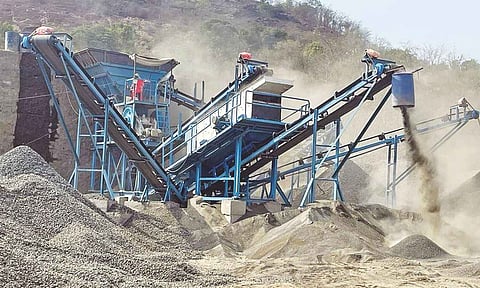Stricter TNPCB guidelines for new stone crusher units
CHENNAI: Even as the recent increase in prices of M-Sand and gravel stones affects the construction sector, the Tamil Nadu Pollution Control Board (TNPCB) has issued stricter guidelines for allowing new as well as expansion of existing stone crushers.
As per the new guidelines, issued on May 6, consent will not be issued for the new stone crushers or expansion of existing stone crushers if the site is located within 500 metres of the reserve forest or within eco-sensitive zones.
Earlier, the reserve forest was not included in the siting criteria, but crusher units were not permitted only near highways, inhabited sites, educational institutions and places of religious importance.
Moreover, expansion of existing crushing units will be permitted only if ambient air quality is within the standards in all directions at radial distance of 500m around the boundary of the unit, according to the new guidelines.
The crushers will be encouraged to establish a nearby quarry site to avoid transportation and reduce pollution.
To control dust pollution, the crushers should construct wind-breaking walls and create concrete roads for the vehicular movement within the premises to avoid re-entrainment of dust into the atmosphere.
The guidelines warn the stone crushers of stringent action, including revocation of consent order, levy of environmental compensation and others for non-compliance with the conditions.
The guidelines have been formulated based on an order issued by the National Green Tribunal (NGT). The order directed the TNPCB to examine the siting criteria for the location of stone crusher units before granting consent and to arrive at different siting criteria for individual stone crushing units and for units to be located in a cluster.
Following the order, a committee with officials from the Central Pollution Control Board, Forest Department, Health Department, TNPCB and NEERI (National Environmental Engineering Research Institute) recommended conditions for new guidelines.
During a stakeholders meeting held in January, it was decided that the TNEB should insist on TNPCB's consent for expansion before sanctioning additional power load to stone crushing units. Moreover, a decision was taken to restrict the expansion to only one time up to a maximum of 100 per cent increase from the consented quantity.

